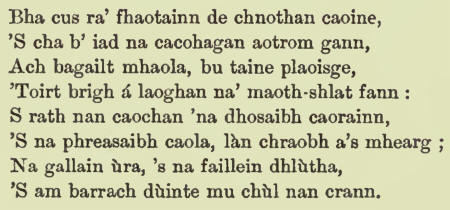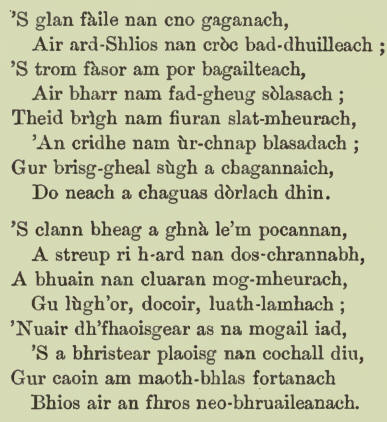|
Early sowing recommended—Vitality of Superstitions—Capnomancy—Hazel
Nuts : Frequent References to in Gaelic Poetry—How best to get at the
full flavour of a ripe Hazel Nut.
A fortnight's incessant
rain [September 1872]—rain descending at times in solid sheets—not only
wets the ground and puddles the roads, but makes one's very brains feel
soft and sloppy and mashed-turnip-wise. You take up a book only to lay
it down again. You fill your pipe and set it alight, but with less than
half a dozen whiffs you are more than satiated. The weed has lost its
flavour. You sit down to write "doggedly," as Johnson says, but with all
your doggedness the pen totters over the sheet with pace uncertain and
listless, as if even he felt disinclined for the task, and the
sentences, like a squad of raw recruits, refuse to fall gracefully into
their places, and stumble against each other in ludicrous confusion, to
the consternation and grief of the most patient of drill-sergeants. You
will not, perhaps, believe it, but it is true, nevertheless, that so
persistent, penetrating, and inter-penetrating has been the last
fortnight's rain, that in nineteen cases out of twenty a lucifer match,
"vesuvian," or fusee will obstinately refuse to ignite by any other
process than putting it into actual contact with fire, and in that case,
why, a slip of paper is just as easily dealt with, as well as more
efficacious for your purpose. Hay and corn luckily stand a good deal of
rain without being completely spoiled, but Ave are afraid to estimate
the amount of damage that another Aveek's
wet weather will cause over the "West Highlands. All our own hay and
corn has been snugly housed more than three weeks ago. Why
shouldn't everybody sow in February or early March as we
do, and have their ingathering in August, generally our best and driest
month 1 In a climate so treacherous and inconstant as ours is, it is the
greatest folly in the world to run the smallest risk that you can
possibly avoid. W| have been preaching this particular doctrine for a
dozen years past, and it has had some effect in our immediate
neighbourhood; but it is sad to see the country at large at this
moment—corn and hay rotting in the fields, that might, with ordinary
prudence and a little effort, be long ere now snug and safe under "thack
and rape."
The more one inquires the truer does he find the dictum
of a philosopher of the last century to be, that " the superstitions, as
well as the languages, of all lands and ages are linked together by
mysterious bonds, which neither time nor distance seem able to destroy."
In our immediate neighbourhood an instance of a very old superstition
was brought under our notice a few days ago, such as, with all our
knowledge of such matters, we had hitherto never dreamt of as existing
in the "Western Highlands. A man went to market at a considerable
distance to sell a good strong two-year-old colt. He did not return on
the day his wife expected him, and she became uneasy, not so much for
the well-being of her laggard liege lord and master—he had
often gone the same errand before, and had always returned safe and
sound, even if a little later than his better half had a right to
expect—but as to whether he had sold the colt, and if for anything like
the price settled between the twain as being his fair price before he
left home. She put on a large fire on her hearth, placing, when it had
reached a certain stage of ignition, a bundle of green alder boughs
atop. When the whole was fully ablaze, she went outside and watched the
direction of the smoke issuing from her chimney. The smoke was carried
in an easterly direction, a lucky quarter, and she returned to the house
and told her daughter that, whatever had come over the father— and she
threatened to tell him a hit of her mind as to his doings on his
return—the colt at least had been sold, and well sold, for the alder
smoke had gone in the hest and luckiest of all directions, towards the
east, in the direction of the rising sun; and she had never known the
omen fail. The curious thing is that within an hour or so on that very
evening the man returned, and counted into his wife's lap two pounds and
four shillings sterling over and above the expected price of the colt,
as agreed upon at home. The only other curious thing that we could
gather in "connection with the superstition is that the alder branches
must be cut specially for the occasion, and by a virgin. It was so in
this case; and we are gravely assured that, if it had been otherwise,
the ascending smoke would either have drifted hither and thither without
a purpose, unsteadily, or have uselessly intermingled with that of the
neighbouring cottages. The superstition, you must know, is a very old
one; the Greeks and Romans practised it, and from them it spread widely
over the European Continent. In books on magic and divination it is
called Capnomancy, derived,
as our friend Professor Blackie could tell you better than anybody else,
from the Greek Capnos, smoke,
and manteia, divination,
witchcraft. The ancients paid attention principally to the smoke of
sacrifices, as well as to the briskness with which the fire burned. If
the smoke ascended in a straight columnar body zenithwards, it was a
favourable omen ; if it was violently blown aside, or fell back over the
altar and the sacrificers, it was of evil augury. Our Highland dame's
notion of its taking an easterly course, towards the direction of the
breaking day, of the dawn, and the morning sun, seems to us full of a
rough and rude poetry such as you frequently meet with in carefully
examining into the details of even the grossest superstitions. Having
had occasion to be of some little service to the priestess in this rare
act of divination, we had the whole from her own lips, though she was
averse at first, as is generally the case when a clergyman is the
inquirer, to entering upon the subject at all. How these practices root
themselves among a people, defying eradication, is very extraordinary.
Did you ever, reader, crack a nut 1 Not the aristocratic
walnut or filbert over your wine, but the far superior, rich, ripe hazel
nut in its season from off the hazel bough, when the bright autumnal sun
was overhead, and the autumnal breeze stirred the leaves around you,
their multitudinous murmur resembling the far-heard music of the
restless sea. A ripe hazel nut is good anywhere, but best of all when
gathered by your own hand in its native wild wood from the overhanging
branch, whence the beautiful cluster nods at you as if soliciting your
attention, now and again, as you approach to pull it, seeming to delight
in playing a game of bo-peep with you among the leaves, like as you have
seen the Pleiades at times when, though the night be clear, many
blanket-like clouds are chasing each other in wild career athwart the
starry blue. Throughout the whole range of poetry, the hazel nut, though
often mentioned, has never perhaps had so much justice done to it as by
the Gaelic bard Duncan Ban Macintyre. In his Coire-Cheathaich, one
of his finest poems, he says :—

Ewen Maclachlan, commonly styled "of Aberdeen," because
he taught the Grammar School there, and there died, but who was, in
tfuth, a Lochaber man—nay, a Nether Lochaber man, born and bred, and
whose ashes rest in Killevaodain of Ardgour, without, we are ashamed to
confess it, " One gray stone to mark his grave;" he, horn, at
Tarrachalltuinn—the Height of Hazel Trees—in our parish, knew something
of hazel nuts, and thus happily describes them in their season :—

Our nuts are unusually plentiful this year, and of a size
and flavour that we do not recollect ever to have seen equalled. They
are now at that stage of ripeness when they are most delicious to the
taste, and one may indulge in any amount of them with perfect safety.
Most people are fond of nuts, hut if the reader wants to enjoy the full
flavour, to get out of a nut all that is in it, let him take the
following recipe:—" First of all, let the nut he cracked, if possible,
between your own molars,
for these are, after all, the first and most natural and best of all
nut-crackers, better quoad
hoc than
an instrument of the purest silver or steel; and there is besides,
remember, something pleasant to the palate in the feel and flavour even
of an uncracked nut. Having cracked your nut, then— and fairly placed
between the grinders, a really good nut is not difficult to crack, the
worst nuts being always the most difficult to deal with, for the more
insignificant the kernel the thicker and dourer the
shell—having cracked your nut and extracted the kernel,
whole if
possible, introduce it into your mouth, not per
se, by
itself, as is commonly done, but with a small fragment of the shell,—a
bit of pin's head size will do. Proceed now to masticate the delicious
morsel, and confess that there is a delicacy and flavour about a hazel
nut that you knew not how to extract in full, although in your day you
had cracked your bushels of them, until you were taught it from Nether
Lochaber. The philosophy of the thing is that the particle of shell
introduced with the kernel causes the act of mastication to be performed
more thoroughly than it otherwise would be, setting free the full
flavour and aroma—all, in short, that a nut has to give. |

